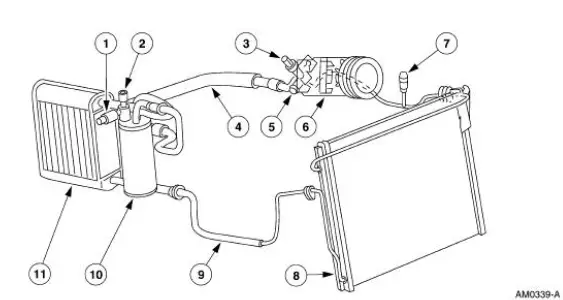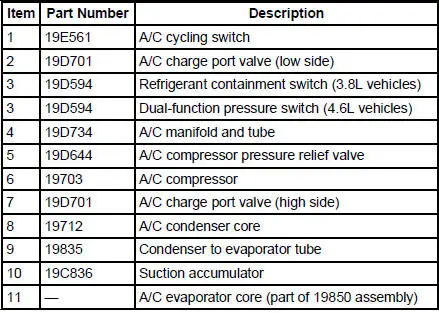Ford Mustang (1999-2004) Service Manual: Air Conditioning (Description and Operation)
The A/C refrigerant system is a clutch cycling orifice tube type. The system components are:
- A/C compressor (19703)
- A/C clutch (2884)
- A/C condenser core (19712)
- A/C evaporator core (19860)
- suction accumulator (19C836)
- connecting refrigerant lines
The refrigeration system operation is controlled by the:
- A/C evaporator core orifice (19D990).
- A/C cycling switch (19E561).
- A/C compressor pressure relief valve (19D644).
- Refrigerant containment switch (3.8L) (19D594).
- Dual-function pressure switch (4.6L) (19D594).
The refrigerant system incorporates an A/C compressor controlled by an A/C cycling switch.
The A/C cycling switch senses A/C evaporator core pressure to control A/C compressor operation.
An A/C compressor pressure relief valve is installed in the A/C manifold and tube (19D734) to protect the refrigerant system against excessively high refrigerant pressures.
An evaporator core orifice is installed in the A/C evaporator core inlet tube to meter the liquid refrigerant into the A/C evaporator core.
A refrigerant containment switch is installed on 3.8L vehicles to cut-off A/C compressor operation in the event of abnormally high refrigerant system pressure.
A dual-function pressure switch is used on 4.6L vehicles for cooling fan control, and to cut-off A/C compressor operation in the event of abnormally high refrigerant system pressure.
Refrigeration System Components


- A/C Compressor and Clutch Assembly
- A/C Compressor Pressure Relief Valve
- Refrigerant Lines
- Evaporator Core Orifice
- Suction Accumulator
- Dual-Function Pressure Switch (4.6L)
- Spring Lock Coupling
 Air Conditioning
Air Conditioning
General Specifications
Torque Specifications
...
 A/C Compressor and Clutch Assembly
A/C Compressor and Clutch Assembly
NOTE: Internal A/C compressor components are not serviced separately.
The FS-10 A/C compressor
is serviced only as an assembly. The A/C clutch pulley, A/C clutch field coil
(19D798) and the shaft
...
Other materials:
Seats (Diagnosis and Testing)
Refer to Wiring Diagrams Cell 120 , Power Seats for schematic and
connector information.
Refer to Wiring Diagrams Cell 122 , Power Lumbar Seats for schematic and
connector information.
Special Tool(s)
73 III Automotive Meter
105-R0057
In ...
Transmission (Assembly)
Special Tool(s)
Dial Indicator Gauge with
Holding Fixture
100-002 (TOOL-4201-C) or
equivalent
Holding Fixture, Transmission
307-003 (T57L-500-B)
Remover/Installer, Bearing
Tube
308-025 (T75L-7025-C)
In ...
Pinpoint Tests
CAUTION: Before removing and installing the GEM or its connectors,
disconnect the
battery. Failure to follow this caution will result in the GEM storing many
erroneous DTCs and it
may exhibit erratic operation after installation.
CAUTION: Be careful when pr ...
